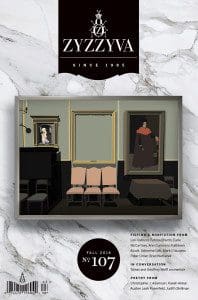“This is really a drag—and a bore,’’ the doomed jazzster Chet Baker tells director Bruce Weber in Let’s Get Lost, in response to (sympathetic) inquiries about his drug habits. The same could be said of the recent controversy over the decision to award the Nobel Prize in Literature to Bob Dylan. In a certain sense, it all makes sense: the high-minded indignation from select members of the literary Establishment (though, some, like Salman Rushdie and Joyce Carol Oates, welcomed the decision), and disgusted repudiation of boomer nostalgia (we get it, Irvine Welsh) in other quarters. It’s of a piece with the kind […]
Category: News
ZYZZYVA news.
Resisting Easy Definition: ‘My Private Property’ by Mary Ruefle
by Meryl Natchez
…there is the poem as a unit-like thing, and then there is the poem that pervades existence, which is much more like the wind, and that is the poem everyone senses from time to time, whether they can read or not, whether they ‘care’ about the unit-like thing or not.—Mary Ruefle, from a 2013 interview with Andrew David King in Kenyon Review It’s hard to define a poem these days. But whether you call the short pieces in Mary Ruefle’s new book, My Private Property (128 pages; Wave Books), poetry or prose poems or essays or flash fiction or mediations or whatever, […]
Obsessions: Wish List
by Vanessa Martini
“Obsessions” is our web-only essay series that asks emerging West Coast writers to examine the books, poems, songs, television shows, images, or whatever else that has been dominating their attentions lately. We continue with this piece by Vanessa Martini. Martini is a bookseller at City Lights Books. She lives in San Francisco. My saved eBay, Etsy, and Craigslist searches, with commentary on what late capitalism’s insidious grasp makes me believe each item will do for my life or say about it: Honda CB450 Four If I get this it means at some point I actually got my driver’s license, which means […]
‘Divination’ by Ann Cummins, ZYZZYVA No. 107, Fall Issue
by me
 Ann Cummins is the author of the story collection Red Ant House (2003) and the novel Yellowcake (2007). A former Lannan fellow, her work has been published in The New Yorker and McSweeney’s and in Best American Short Stories 2002.
Ann Cummins is the author of the story collection Red Ant House (2003) and the novel Yellowcake (2007). A former Lannan fellow, her work has been published in The New Yorker and McSweeney’s and in Best American Short Stories 2002.
Her story “Divination” is set in the Southwest region in which Cummins was born, but takes place in a distant era, one that places the narrative in the category we would call a Western (and as anybody who has read Stegner, Cather, McCarthy, or Oakley Hall knows, what a wide and rich category it is). A story about the uncompromising realities of family and laboring from the land, “Divination” is another welcome example of Cummins artistry. The following is an excerpt from her story. It can be read in its entirety in Issue No. 107, which you can order here.
[…]
In Conversation with Geoffrey and Tobias Wolff, ZYZZYVA No. 107, Fall Issue
by me
 The following is the introduction from a conversation between our contributing editor Andrew Foster Altschul and Geoffrey and Tobias Wolff. You can read an excerpt of their conversation following the introduction, and, of course, can read the conversation in its entirety in Issue No. 107, which you can buy here.
The following is the introduction from a conversation between our contributing editor Andrew Foster Altschul and Geoffrey and Tobias Wolff. You can read an excerpt of their conversation following the introduction, and, of course, can read the conversation in its entirety in Issue No. 107, which you can buy here.
It’s hard to think of a pair of writer-siblings as celebrated, or as prolific, as Geoffrey and Tobias Wolff. Between them, they’ve written nineteen books, including novels, short-story and essay collections, and a travel narrative. But it was their acclaimed memoirs Geoffrey’s The Duke of Deception (1979) and Tobias’s This Boy’s Life (1989)—that first earned them wide readerships. The brothers’ parents split up when Geoffrey was twelve and Tobias was five, and they grew up separately: Geoffrey with their father and Tobias with their mother. The memoirs deal with their unusual childhoods, from perspectives that overlap only occasionally—the brothers did not really get to know each other until they were young adults. Over their careers, both have won numerous accolades and have risen to positions of prominence in academia—Geoffrey as the director of the graduate writing program at the University of California at Irvine, Tobias as professor of English at Stanford University. I am one of only a few writers lucky enough to have studied with both Wolffs. In 2012, I invited them to the Center for Literary Arts at San Jose State University for a public conversation about memory, family, and the precarious art of writing one’s own life.
[…]
The Opportunity to Understand What’s Different: Q&A with Christine Sneed
by Paul Wilner
Over the course of a relatively short but extremely productive literary career, Christine Sneed has already achieved a substantial, and enviable, body of work. Her first story collection, 2009’s Portraits of a Few of the People I’ve Made Cry, was awarded the AWP Grace Paley Prize and long listed for the Frank O’Connor International Short Story prize. Both for its attention to detail, and its close, caring, but unsentimental attention to the complicated lives of women (and men), Portraits is in Paley’s spirit at the same time as it honors the tradition of what O’Connor called “the lonely voice’’ that […]
An Era, and Its People, Shaped by a Plague: ‘Christodora’ by Tim Murphy
by Ismail Muhammad
Tim Murphy’s latest novel, Christodora (432 pages; Grove Press), arrives in the middle of a cultural yearning for the seedier, more affordable, which is to say “idealized” Manhattan of yesteryear. Novels like Garth Risk Hallberg’s City on Fire and television shows like Netflix’s The Get Down have embraced nostalgia for the cultural ferment of New York City in the ’70s and ’80s, its sense of an expansive and generative squalor. Superficially, Christodora bears this same stamp. Titled after a run-down East Village apartment complex two of Murphy’s protagonists buy for dirt cheap, the novel lovingly renders New York at its […]
In the Fall Issue
by ZYZZYVA
Our Fall issue, replete with fiction, nonfiction, and poetry: A wide-ranging and revealing conversation between Andrew Foster Altschul and Geoffrey and Tobias Wolff, on writing, memory, and the craft of memoir. Lori Ostlund’s “A Little Customer Service”: A waitress questions the value of services rendered when she finds herself in the bed—and the distressed home—of a rich, carefree customer. Ann Cummin’s “Divination”: The burden of a brother toiling the land, serving his no-account father. Adrienne Celt’s “Big Boss Bitch”: They were certain they’d found the perfect female candidate for president. Then she started thinking on her own. Mark Chiusano’s “The […]
A Reading List for These Dark Times
by me
When Donald Trump announced his campaign for the Republican presidential nomination last June, the whole production had a farcical air. The surreal sight of his too-long descent down an escalator, magnified by the hired actors awkwardly cheering him on the entire way, elicited ridicule. His baldly racist nativism was beyond the pale even for dog-whistle Republican politics, and immediately earned him the ire of the GOP establishment. His speech, generally incoherent even as it gave voice to legitimate grievances, didn’t do him any favors; if he couldn’t even articulate a platform, how was he going to run a serious campaign? Pundits […]
A World of TV Eyes: ‘The Continuous Katherine Mortenhoe’ by D.G. Compton
by Zack Ravas
From Google Glass to drone warfare and genetic modification, it’s fair to say that our contemporary world bears more than a passing resemblance to the science-fiction novels of yesteryear. Originally published in 1974, English writer D.G. Compton’s The Continuous Katherine Mortenhoe, recently reprinted by New York Review Books Classics, is a vintage piece of speculative fiction that feels of the here and now, and startlingly so. Mortenhoe opens on a society that could very well be our own in another fifteen years: a culture rife with economic disparity, where most diseases have been eradicated and the populace is sated by […]
A Terrible Twist of Fate, the Birth of a Writer: ‘Will & I’ by Clay Byars
by Will Howard
Clay Byars’ memoir, Will & I (192 pages; FSG Originals), could have opened on the car crash that changes Byars’ life at 20. It could have opened nine months after the crash when surgery that is supposed to fix the nerve damage in his shoulder results in a stroke that leaves him paralyzed and near death once more. It could have even opened on the stroke itself, the dizziness and life receding “to a dreamlike distance.” It could have opened on any one of the many dramatic circumstances punctuating Byars’ life, but instead it opens on a singing lesson. After […]
The Pain Hard to Name: Q&A with ‘Swallowed by the Cold’ Author Jensen Beach
by Will Howard
The stories in Jensen Beach’s second story collection, Swallowed by the Cold (208 pages; Graywolf Press), demonstrate again and again that self-destruction doesn’t happen in a vacuum. In “Kino,” we meet a young man named Oskar who swears he intended to torch just his own boat, but who ended up setting fire to an entire marina. Oskar happens to work at what seems to be a gay brothel called Kino Club, which an uptight man named Martin frequents. The two encounter each other at a party where Martin’s wife, Louise, gets too drunk. Suffering under the weight of Martin’s self-denial, […]
